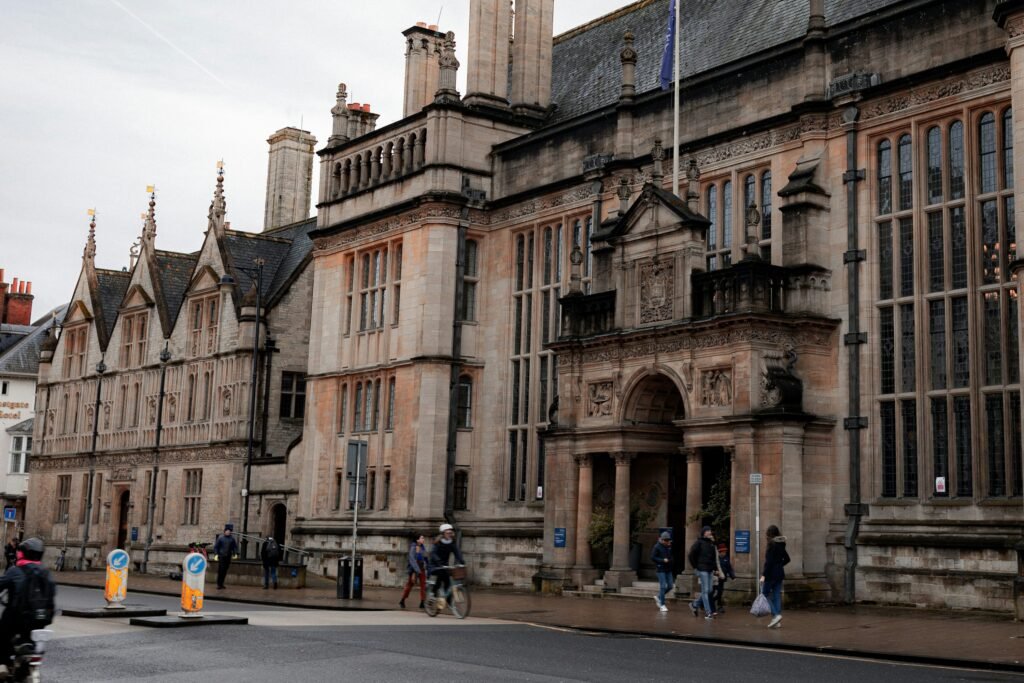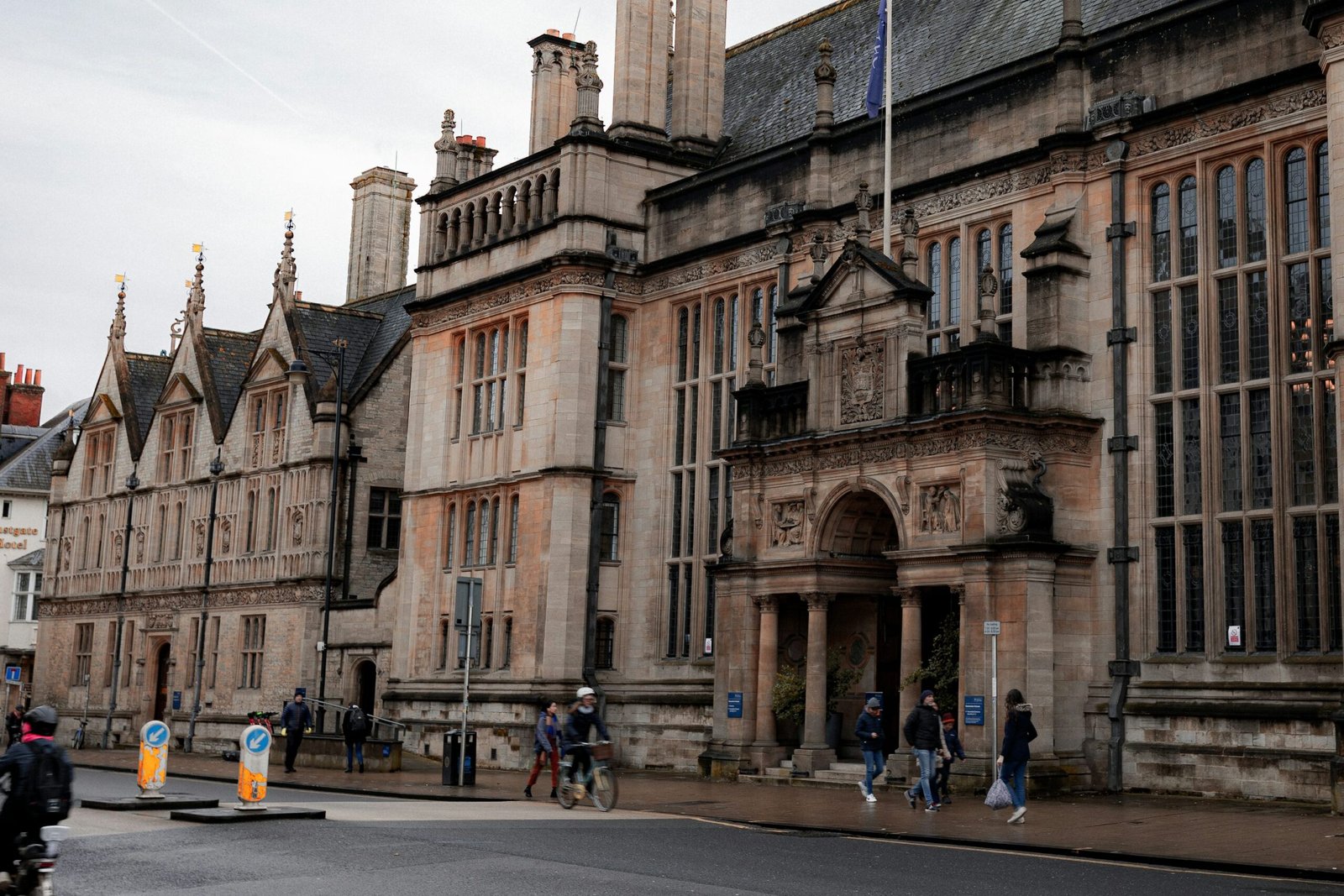Introduction: The Global Legacy of Oxford University
When people think of elite education, Oxford University is often the first name that comes to mind. With a history that spans over 900 years, Oxford is the oldest English-speaking university in the world and one of the most recognized academic institutions globally. Its impact on literature, politics, science, and philosophy is unparalleled, having produced scholars, world leaders, Nobel laureates, and cultural icons for centuries.
Nestled in the medieval town of Oxford, England, the university’s gothic buildings and cobblestone streets hold not just history but a legacy of discovery, debate, and innovation. In this guide, you’ll discover everything you need to know about Oxford—from its academic offerings and admissions process to campus life, notable alumni, scholarships, and its role in shaping the modern world.

Why Oxford University Is a Symbol of Academic Excellence
Oxford is not just famous for its age—it’s globally respected for its:
- Rigorous academic standards
- Unique tutorial-based teaching model
- World-class faculty and researchers
- Rich student traditions and college system
- Unmatched influence in public service, literature, and science
With over 25 British Prime Ministers, 120 Olympic medalists, and over 70 Nobel Prize winners among its alumni, Oxford is not only a place of learning—it’s a symbol of leadership and intellectual mastery.
A Look Back: The Timeless History of Oxford
Founded in the 12th century, Oxford’s history is deeply intertwined with the development of Western education. Teaching existed in Oxford as early as 1096, but the university truly blossomed after 1167, when English students were banned from attending the University of Paris.
Oxford grew in size and reputation, and by the 13th century, it had become an internationally recognized center for learning. Over the centuries, the university has survived civil wars, monarchic disputes, and global upheavals—yet its commitment to knowledge and debate has remained unwavering.
Today, Oxford stands as a bridge between the past and future of global education.
Structure of the University: Colleges, Departments, and Faculties
Oxford’s structure is unique. Instead of having one central campus, the university is composed of 39 independent colleges and 6 permanent private halls, each with its own traditions, dining halls, libraries, and student accommodation.
In addition to colleges, Oxford has academic departments which manage subject-specific teaching and research. These departments are grouped into four academic divisions:
- Humanities
- Medical Sciences
- Mathematical, Physical, and Life Sciences
- Social Sciences
This dual structure creates a personalized learning experience while offering access to large-scale research and academic resources.
Academic Programs and Areas of Study
Oxford offers a wide array of undergraduate and postgraduate degrees, covering nearly every area of study imaginable.
Popular Undergraduate Programs:
- Philosophy, Politics, and Economics (PPE)
- Law (Jurisprudence)
- Medicine
- Engineering Science
- Modern Languages
- Computer Science
- History and English
- Biological Sciences
Postgraduate Opportunities Include:
- Master’s and Doctoral research degrees (MPhil, DPhil)
- One-year taught Master’s programs
- MBA and Executive Education at the Saïd Business School
- Advanced degrees in Theology, Environmental Science, Public Policy, and Artificial Intelligence
Every program is designed to challenge students intellectually while giving them freedom to explore ideas deeply and independently.
What sets Oxford apart from most universities is its tutorial-based system, where students engage in regular, small-group sessions (often one-on-one) with expert faculty members.
These tutorials are intensive, discussion-based learning environments where students analyze texts, defend arguments, and receive direct, personalized feedback. It encourages critical thinking and intellectual agility—skills that define Oxford graduates worldwide.
Admissions Process: What It Takes to Get Into Oxford
Oxford’s admissions are extremely competitive, and candidates must show exceptional academic ability, passion for their subject, and the potential to thrive in the tutorial environment.
Admission Requirements:
- Excellent school grades or predicted scores
- Academic references and teacher recommendations
- Personal Statement explaining your passion for the subject
- Oxford-specific admissions tests (depending on subject)
- Interview process conducted by college tutors
- English language proficiency for non-native speakers
Oxford does not care about extracurriculars unless they directly relate to your chosen subject. It’s about intellectual ability and curiosity first.
Application Timeline:
- Applications open: Early September
- Deadline: October 15 (a year before intended admission)
- Interviews: December
- Decisions: January
International students should prepare at least 12–15 months in advance to navigate testing, visa, and interview requirements.
Scholarships and Financial Aid
Oxford provides substantial support to make education accessible regardless of financial background.
Scholarships for Undergraduates:
- Oxford Bursaries for UK students from low-income families
- Crankstart Scholarships
- Reach Oxford Scholarship for students from developing countries
- Scholarships for refugees and displaced persons
Graduate Scholarships:
- Rhodes Scholarship (one of the world’s most prestigious awards)
- Clarendon Fund Scholarships
- Commonwealth Shared Scholarships
- Weidenfeld-Hoffmann Scholarships
- Chevening Scholarships (administered by the UK government)
In total, Oxford offers over £50 million in financial aid each year.
Student Life at Oxford: Culture, Clubs, and Traditions
Oxford is not all academics—it’s a vibrant, global community with a rich student life.
College Life:
Each college provides accommodation, social spaces, and a close-knit community of students and faculty. Students often develop strong loyalty to their college, participating in inter-college competitions and traditions.
Societies and Clubs:
With over 400 student-run organizations, there’s something for everyone:
- Oxford Union (world-renowned debating society)
- Drama and Music Societies
- Political groups
- Sports and rowing clubs
- Journalism and student media
- Entrepreneurship and innovation hubs
Cultural Life:
Oxford hosts concerts, exhibitions, film screenings, formal dinners, and public lectures almost daily. The fusion of tradition and modern creativity makes campus life truly unique.
